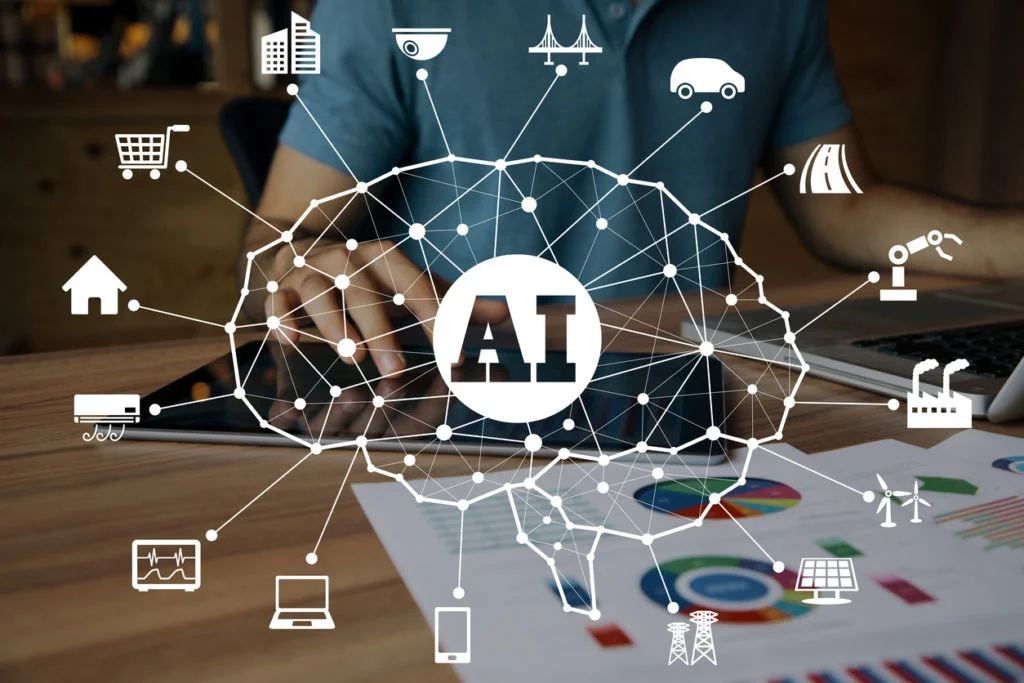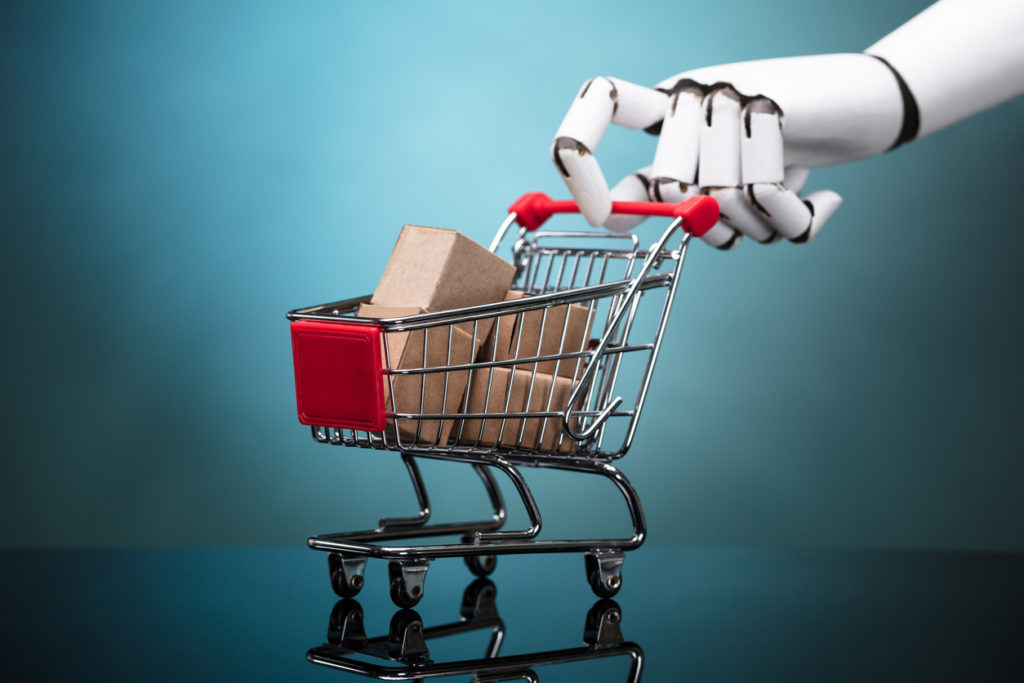Before COVID-19, eCommerce was among the fastest-growing industries in the business world. In the post-pandemic digital-first economy, it has become an essential aspect of everyday life as modern consumers kick-start their purchase journeys online.
Moreover, amid the pandemic, we’ve seen the number of online transactions rise above the number of in-person transactions even after the lockdowns. However, it wasn’t just COVID that accelerated its global acceptance. The industry remains in constant transition with the emergence and adoption of new technologies.
However, no technology has played a bigger role in eCommerce digital transformation than artificial intelligence. Therefore, in this post, we’ll learn how AI has reshaped every aspect of the customer experience on eCommerce websites.
But before we get right into it, we’ll dive deeper into digital transformation for the eCommerce industry.
eCommerce Digital Transformation
The core purpose of an eCommerce store has always been to help businesses establish a digital door front for their goods and services while leveraging other parties for stock, transport, delivery, and other functions.
Today, a typical eCommerce ecosystem comprises:
- Product orders and Purchasing
- Inventory Management
- Order fulfillment
- Logistics (In-house/third-party)
- Accounting
- Delivery, etc.
As you can see, eCommerce is a chain of complex connected operations that can be optimized with enhanced digitalization and technology adoption. Moreover, depending on the model (B2B, B2C, B2B2C, etc.), the chain becomes further complex with more layers added to the mix. As a result, eCommerce digital transformation is as scary as it is exciting.
However, at its core, this process entails exploring different enhancement opportunities in the value chain to improve operational efficiency and user/customer experience. For instance, it could simply involve adopting a powerful ERP or inventory management system to enhance operations.
eCommerce stores could also adopt new development technologies, such as headless WordPress, Voice Search optimization, or API-first development of their store’s UI/UX design for better shopper access to products. Other changes could include:
- Adopting live chat support for 24/7 availability
- Cloud adoption for more storage, backup, and disaster recovery
- Cybersecurity enhancement using emerging technologies (AI fraud detection, blockchain, new payment gateways, etc.)
In other words, eCommerce digital transformation involves using company-wide process and environment knowledge to integrate solutions that can streamline, automate, enhance, or even centralize different touchpoints.
The Role of Artificial Intelligence in eCommerce Transformation
Like eCommerce, artificial intelligence has been embedding itself into different aspects of our lives, from our streaming platforms (Netflix) to manufacturing and even autonomous vehicles. With giants like Google, Microsoft, Amazon, and Facebook using their applications, the technology has been in turbo drive long before the pandemic.
However, no industry can reap its full benefits in every aspect of its operations like eCommerce. For instance, did you know that Amazon has been using AI and machine learning to optimize product selection and logistics?
According to a 2021 report by McKinsey & Company, several other retail industry leaders, such as Walmart, Ultra Beauty, Starbucks, IKEA, etc., are adopting AI-informed technology in their operations and digital platforms.
In other words, the once novel technology has become a core technology fueling eCommerce transformation with its core functionalities – data mining, machine learning, and natural language processing.
Data Mining
This term refers to the collection of historical and real-time data for future predictions. For example, Netflix’s algorithm uses our search behavior to suggest new shows and movies.
Natural Language Processing
This function focuses on the human-machine interaction and can be used to enhance voice or written search on sites.
Machine Learning
Finally, the machine learning function of AI focuses on using algorithms based on past experiences to solve problems or generate a greater understanding of data.
11 Ways AI Is Transforming eCommerce
AI has come a long way since its inception. It has matured beyond recognition and has become one of the most important technologies in the eCommerce industry. Let’s check out 11 ways it’s helping eCommerce and online retail stores improve their services:
1. Personalization and Marketing Orchestration
As mentioned above, artificial intelligence is a powerful tool that extracts actionable insights and predictions from large datasets. In the eCommerce landscape, this dataset mostly contains customer and product information. Therefore, it can be used to enhance personalization and boost sales, retention, and loyalty.
Many stores use AI to generate accurate product recommendations based on search history, cookies, clicks, searches, and purchase history, among other parameters.
Moreover, in the age of smartphones and connected mobile devices, AI can be used to facilitate and enhance marketing orchestration, enabling stores to leverage multiple platforms (sites, apps, social media, email, SMS, etc.) to promote their products at their customers’ preferred touchpoints.
AI-powered marketing functions help businesses demonstrate they know and care about their audiences to build positive brand perception. Due to its speed and automation benefits, you can increase sales and loyalty without employing additional human resources.
2. Data Analytics
Along with personalization and marketing orchestration, AI in the eCommerce space helps leaders and marketing analysts make more informed decisions with the help of accurate sales, stock, and behavioral insights and forecasts.
A fashion retail company’s product sales prediction process got a major accuracy boost by using the software developed by Achievion. The platform improved company operations by a significant margin.
However, in terms of analytics, the most outstanding benefit of AI has enhanced targeting. In other words, using this technology, businesses can better understand where their target audience and customers come from, their product or service interests, age, gender, and other segmentation factors. With more customer profiles, marketing can develop more targeted lead generation campaigns.
3. Smart Logistics (Warehouse/Inventory Management)
One of the most pressing challenges retail and eCommerce stores face is logistics. Fortunately, this is where AI comes in to optimize space, logistics, supply chain, and delivery times. According to Gartner, nearly 80% of eCommerce businesses adopted AI into their supply chain and inventory management operations in 2021.
Integrating AI’s predictive capabilities into their logistics allows them to organize and streamline their process according to their customer’s buying behavior.
Tasks that help streamline processes include:
- Anticipating changes in demand to update inventory and stock to prevent shortage or minimize overstocking expenses.
- Carrying out proactive maintenance to prevent potential damage
- Automating functions, such as packing and loading, using AI-enhanced equipment
- Monitoring facility environment (temperature, lighting, humidity, etc.)
4. Voice and Image Search
In the last decade, voice search has become a popular feature in modern smartphones and smart devices, especially the likes of Google Home and Alexa. Today, nearly 60 million US consumers use these devices for AI shipping at least once a month instead of conventional online or offline shopping.
Moreover, Google and other platforms have recently launched a visual search to enable users to find products by images instead of text. As a result, they can reduce the time spent on inaccurate queries and speed up their purchase journeys.
5. Chatbots
Chatbots are among the earliest commercial AI applications in the online retail industry. However, we’ve quickly transitioned past human representatives dealing with several clients simultaneously in the middle of the night to AI-enhanced chats providing accurate recommendations and query resolutions.
Chatbots are perhaps the best representation of how AI-enhanced eCommerce can combat different business challenges at the same time. With the aid of NLP, it can process written or spoken language and respond just like a human would. Moreover, it can provide 24/7 support without human intervention since Chatbots don’t need sleep or rest.
6. Virtual Assistants
For a long time, online shopping has prioritized convenience, often at the expense of experience. However, the emergence of AI has enabled brands to enhance the online shopping experience by nearly replicating the feel of walking into a physical store through virtual shoppers.
This game-changing innovation mimics the role of an in-store sales professional and takes the conversational capabilities of AI Chatbots to the next level. With this tool integrated into your site or mobile app, you can:
- Enable users/customers to share what they’re looking for via text or speech and display different relevant items instantly.
- Provide detailed product descriptions, prices, and delivery information on a single screen.
- Guide customers from awareness to checkout seamlessly.
- Promote special offers, upcoming product launches, and seasonal discounts according to user behavior.
7. Automated Product Tagging and Pricing
Another great use of AI in eCommerce is enabling automated product tagging, especially for large stores selling a vast range of products. This way, retail companies and stores can easily update their catalog and tag them according to size, category, material, and other relevant factors. Automated product tagging improves stock and inventory management as well as product discovery.
This classification task can be automated and enhanced with AI, while your team can perform other important tasks that require human intervention.
8. Financial Intelligence
Along with its marketing and customer experience perks, AI for eCommerce can provide businesses with financial intelligence. Using insights from buyers and competitors, they can generate real-time pricing suggestions to respond to market fluctuations, thus, limiting the need for manual updates.
Moreover, they can alter their product assortment strategy and adjust their product mix depending on the financial situation.
9. Integration With Everyday Household Appliances
One of the best examples of AI integration is the partnership between LG’s Smart InstaView fridge. The InstaView refrigerator features a huge touchscreen built into the door enhanced with a virtual assistant and a dedicated operating system (WebOS).
Currently, it provides news, weather updates, and a digital space for notes and pictures. However, it’s an excellent tool for pantry management. Imagine the possibility of never having to run to a nearby store. You could simply tap on your fridge to order from the nearest eCommerce retailer.
10. Privacy Enhancement
For years, consumers have believed that personalized shopping comes at the expense of privacy. Following the growing number of Cybersecurity threats during the pandemic, the eCommerce industry, along with several others, has faced severe scrutiny from regulatory bodies.
As a result, brands need to be more transparent about their data collection and enhance security without abandoning user personalization. Fortunately, this is where artificial intelligence can help. It’s no secret that modern consumers are triggered by incentives, such as discounts, offers, and anything valuable in return for their information.
For instance, Alexa can help inform you about your daily routine, find products, and get the daily news, among other functions. However, this is at the expense of providing your account details, search history, calendar, and emails. During the pandemic, Amazon even enabled the VA to buy products on your behalf.
The AI technology in these devices provides outstanding shopping experiences without even visiting an eCommerce store. For this quick, unique, and seamless experience, users are happy to share their valuable information and help businesses bridge the gap between privacy and personalization.
11. Security Enhancement
In the last two decades, online businesses used firewalls, antimalware software, and proxy servers, among other conventional solutions, to protect their sites and apps from online threats. While these technologies have been effective in the past, Cybersecurity threats have become far more sophisticated in the post-pandemic digital age. Therefore, these solutions may no longer cut it.
Here, artificial intelligence comes in to help eCommerce stores automate and enhance the threat identification and mitigation process with machine learning. It offers a proactive approach to thwarting attacks before they happen by spotting anomalies and vulnerabilities in the digital environment.
Moreover, AI can also help eCommerce customers secure their accounts with better password protection and multifactor authentication.
Final Word
So, there you have it – 10 ways AI is transforming eCommerce. With this information, you can transform your eCommerce store and use this innovative technology to analyze thousands or even millions of daily interactions and personalize your customer experience using actionable insights.
Artificial intelligence is one of the leading technologies fueling eCommerce digital transformation. In other words, it is the future of online retail. So, now is the time to develop or enhance your AI-driven digital platforms to increase your eCommerce sales, customer retention, and bottom line.
Achievon is an AI consulting, product development, and enablement company specializing in hyper-personalization, anomaly detection, and resource optimization. Since our founding, we have been at the forefront of AI innovation and can help you build or transform your eCommerce application.
So, feel free to get in touch with our team to learn more about our AI solutions.









